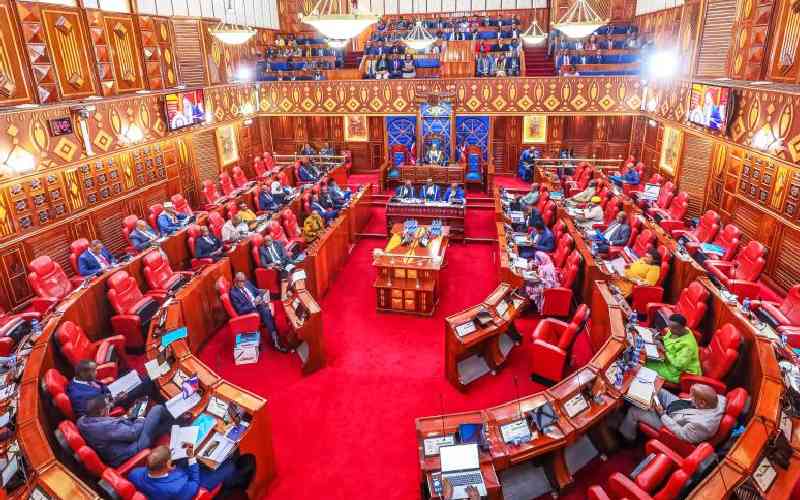By XN Iraki
Kenya: The Kiambu Governor William Kabogo recently caused an uproar when he told women in Kiambu to marry.
He may have been reacting to the reality in central Kenya where fathers are becoming a rarity but not the birth of children.
To be fair, children born to unmarried mothers are a global phenomenon. In Iceland, Norway and Sweden, the figure is more than 50 per cent of births.Among African Americans in the US, the percentage rises to about 75 per cent.
These countries are developed and social welfare is well established. Women can bring up their children single-handedly, or get child support from their fathers.
In Kenya, bringing up a child alone is not fun. Child support is hard to enforce and even if it wasn’t, some fathers could be in need of support themselves.
It is a basic truth that a family setting is the most economic way to bring up kids, not just because of the emotional security, but also because resources are shared — remember economies of scale? The family setting has another hidden advantage: children get an identity and that gives them confidence in life.
The family explains the phenomenal successes of Asian community in Kenya. Have you seen their children begging on the streets?
Some may argue it’s because they are affluent. But they are affluent because they have strong families. With a strong family, children gain confidence to deal with the world. They have a refuge, not just physically but also emotionally.
Strong families may explain another interesting statistic: Asians constitute 3 per cent of the US population but make up about 17 per cent of admissions to Ivy League universities like Harvard.
The problem
What went wrong in central Kenya, where the best symbol of family breakdown is the use of mothers’ names as surnames, like Njoroge Wanjiru or Jane Wangui Wanjiku? Some argue it has its roots in the emergency period when women were left at home as the fathers went to fight in the forest. Some argue it is women empowerment taken literarily.
But the real cause is more complex because central Kenya is religious — so religious that William Kabogo had to apologise at a religious gathering. Most televangelists are from this region, so it would logically follow that with such “religiosity”, family values would be central.
The real reason could be economic.
Without economic anchors, most men fear the responsibility of bringing up a family. Contrary to popular belief, poverty is rampant in central Kenya, where land was long subdivided. It is no wonder that natives of this place are so enterprising — out of need. Their contemporaries in entrepreneurship are from Kisii, where land is equally scarce. India is very crowded, which is why they make their way to other countries and are enterprising.
Stay informed. Subscribe to our newsletter
But there is another factor at play: the end of the old order.
Previously, there were sanctions for “breaking the leg of someone’s goat”, to use the convoluted language that describes impregnation in the region. Today, there are none, and few parents ask their daughters any question after pregnancy.
But single parenthood is two way — men are also to blame for not being “husbandable”. We are lenient on them when they go planting seeds everywhere, yet when they’re ready to marry, they look for a virgin.
My hunch tells me that women are ready to settle in marriage even at 18, but not men. After waiting for men who never propose, women probably secure their future with kids and leave the man alone. Do we have an award for women who bring up children single-handedly?
The solution
So what is the way out?
If Governor Kabogo ensures the Kiambu economy improves, marriage rates will go up.
Kiambu is very near Nairobi and it should leverage on that. It should become Nairobi’s bedroom, but go beyond that. The rich, fertile land in the county would be more productive and useful if set aside for agriculture, not rental houses. We can build in Kitengela and Athi River but can’t farm there. The weather in Kiambu is central Kenya’s greatest asset.
Agribusiness would drive Kiambu to become the richest county in Kenya, even able to lend money to the central government. But that agriculture must be practiced by the small man, the hoi polloi. Plantations are not enough.
Can some good aspects of the traditional way of life in this region be preserved? Has any governor proposed a tax rebate for married couples?
We can boldly predict that by 2063, when Kenya will be celebrating 100 years of Uhuru, the most progressive counties are those that will make family values the anchor of their socio-economic policies.
If other governors don’t heed Kabogo’s advice, central Kenya will be the Mississippi of Kenya — always last in any ranking.
***
Historical confession: My dad tried to get land in Kiambu in 1927, he failed ... I tried to get a wife from there, I failed.
The writer is MBA programme coordinator, University of Nairobi. [email protected]
 The Standard Group Plc is a
multi-media organization with investments in media platforms spanning newspaper
print operations, television, radio broadcasting, digital and online services. The
Standard Group is recognized as a leading multi-media house in Kenya with a key
influence in matters of national and international interest.
The Standard Group Plc is a
multi-media organization with investments in media platforms spanning newspaper
print operations, television, radio broadcasting, digital and online services. The
Standard Group is recognized as a leading multi-media house in Kenya with a key
influence in matters of national and international interest.
 The Standard Group Plc is a
multi-media organization with investments in media platforms spanning newspaper
print operations, television, radio broadcasting, digital and online services. The
Standard Group is recognized as a leading multi-media house in Kenya with a key
influence in matters of national and international interest.
The Standard Group Plc is a
multi-media organization with investments in media platforms spanning newspaper
print operations, television, radio broadcasting, digital and online services. The
Standard Group is recognized as a leading multi-media house in Kenya with a key
influence in matters of national and international interest.





